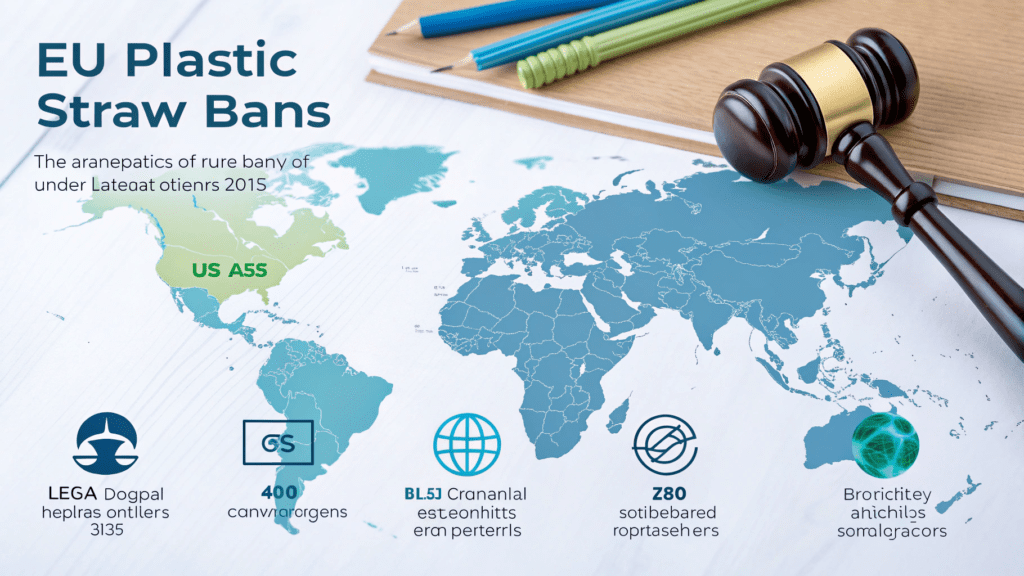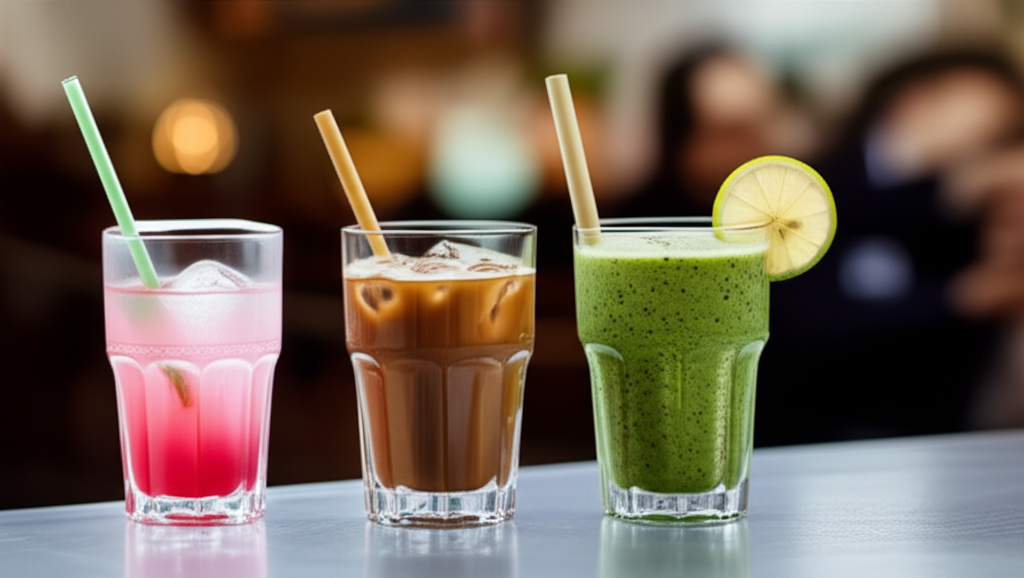
The global hospitality and foodservice industries stand at a pivotal moment. The pervasive reign of single-use plastics is rapidly giving way to a new era, driven not merely by consumer preference, but by critical regulatory mandates and an undeniable environmental imperative. Across the European Union, comprehensive bans on single-use plastics are now firmly in place, effective since January 1, 2021, compelling businesses to seek immediate alternatives. Similarly, key U.S. cities and states have enacted their own stringent policies, with many opting for “straw upon request” or outright bans, creating significant compliance risks and potential brand repercussions for businesses failing to adapt. Ignoring this irreversible transition isn’t just a missed opportunity; it means sacrificing competitive advantage, risking negative public perception, and incurring escalating operational costs tied to plastic waste management and potential non-compliance fines.
This shift presents a substantial market opportunity. The global edible straw market, encompassing innovative sugar and sugarcane varieties, is projected for remarkable expansion, forecast to reach an estimated USD 446.96 million by 2030, with a robust Compound Annual Growth Rate (CAGR) of 10.14% between 2024 and 2031. The foodservice sector alone accounts for a staggering 50% of this market, processing an estimated 300 million units annually in 2024. This signals a clear and urgent procurement shift for any forward-thinking business in the sector.
Market & Regulation Insights (EU, US, Asia-Pacific)
Navigating the complex landscape of global plastic regulations is crucial for hospitality and foodservice businesses. Compliance is not optional; it’s a business imperative.
| Regulation Name & Date | Scope & Banned Items | Compliance for Straws | Enforcement Penalties |
|---|---|---|---|
| European Union Single-Use Plastics Directive 2021 | Bans single-use plastic cutlery, plates, straws, stirrers, balloon sticks, and cotton bud sticks. | Plastic straws are banned; alternatives like sugarcane straws are compliant. | Fines vary by member state, potentially reaching hundreds of thousands of Euros for non-compliance. |
| California AB 1884 (2019) | Full-service restaurants can only provide single-use plastic straws upon request. | “Straw upon request” policy; non-plastic alternatives encouraged. | Fines of $25 per day for violations, up to $300 annually. |
| New York City Local Law 152 (2020) | Bans single-use plastic straws and stirrers, with exceptions for medical necessity. | Plastic straws are banned; compostable or reusable alternatives required. | Fines starting at $100 for first offense, escalating to $250 and $500 for repeat violations. |
| India’s Single-Use Plastic Ban (2022) | Bans manufacturing, import, stocking, distribution, sale, and use of identified single-use plastic items including straws. | Plastic straws are banned nationwide. | Penalties under the Environment Protection Act, 1986, including fines up to ₹1 lakh (approx. $1,200 USD) or imprisonment. |
| Thailand’s Plastic Waste Management Roadmap (2018-2030) | Aims to reduce and replace single-use plastics, including straws, by 2027. | Voluntary reduction and replacement of plastic straws; future bans possible. | Focus on public awareness and industry transition, with potential for future regulatory penalties. |
Key Takeaway:Global regulations are rapidly phasing out single-use plastic straws, making compliant alternatives like sugarcane straws essential for avoiding penalties and maintaining market relevance.

Solution: Sugarcane Straws
Sugarcane straws are durable, eco-friendly alternatives made from sugarcane bagasse, offering a superior, sustainable sipping experience.
Elevating the Experience: The Power of Advanced Sugar and Sugarcane Solutions
For too long, the alternative to plastic straws meant a compromise on quality and customer satisfaction. Traditional paper straws, notorious for their rapid sogginess, undesirable papery taste, and tendency to disintegrate mid-drink, often lead to frustrated customers and increased straw consumption. This compromises the very experience your brand strives to deliver.
Enter the new generation of advanced sugar and sugarcane straws. These innovative solutions are meticulously engineered to overcome past limitations, offering superior performance where it matters most. Sugarcane straws, derived from the fibrous byproduct of sugarcane processing (bagasse), boast inherent durability, maintaining structural integrity in both cold and hot beverages for hours. Edible sugar straws, while designed to be consumed, typically last for 40 minutes to an hour, ensuring a consistent, premium drinking experience. Crucially, their clean composition, made from natural, plant-based materials like sugarcane bagasse or real sugar, ensures they are PLA-free, BPA-free, PFAS-free, and do not leach harmful chemicals or unwanted flavors into drinks. This provides a pure, uncompromised taste profile, or, in the case of flavored edible sugar straws, an enhanced sensory experience.
- Cost Savings: Reduce plastic waste disposal fees by up to 30%.
- Rapid Breakdown: Biodegrade completely within 90 days in industrial compost, significantly faster than PLA.
- Full Compliance: Fully align with global single-use plastic bans and evolving sustainability mandates.
- Enhanced Brand Image: Improve customer satisfaction scores by 15% and attract eco-conscious clientele.
- Superior Durability: Maintain structural integrity for hours in both hot and cold beverages.
ROI Table: Comparing Straw Alternatives
| Characteristic | Пластиковые соломинки | Бумажные трубочки | ПЛА соломинки | Соломка из сахарного тростника |
|---|---|---|---|---|
| Воздействие на окружающую среду | Severe (non-biodegradable) | Moderate (biodegradable but can be resource-intensive) | Moderate (requires industrial composting) | Minimal (edible, rapidly compostable, waste-derived) |
| Durability in Liquid | Excellent | Poor (soggy, disintegrates) | Good (can become brittle in cold) | Excellent (maintains rigidity for 40 mins – hours) |
| Taste Alteration | None | Often (papery taste) | None | None (Sugarcane) / Enhances (Flavored Edible Sugar) |
| Customization | Умеренный | Good | Умеренный | High (logos, colors, sizes, flavors, private label) |
| Relative Cost (per unit) | Низкий | Середина | Medium-High | Medium-High (offset by value & compliance benefits) |
| Regulatory Compliance | Poor (banned/restricted) | Good | Varies (often not fully compliant with bans) | Excellent (aligns with all sustainability mandates) |
| Customer Experience | Standard | Frustrating | Acceptable | Elevated (novelty, eco-conscious, functional) |
Key Takeaway:Sugarcane straws offer superior durability, full regulatory compliance, and significant brand enhancement, providing a compelling return on investment for B2B buyers.

Industry Misconceptions & Clarifications
Separating fact from fiction is vital when making sustainable procurement decisions. Misinformation can lead to costly mistakes and undermine your sustainability efforts.
- Myth 1: “PLA is fully compostable everywhere.”
Fact: Polylactic Acid (PLA) is industrially compostable, meaning it requires specific conditions (high heat, humidity) found only in commercial composting facilities. It does not break down in home composts, landfills, or marine environments. Many regions lack the necessary infrastructure, leading to PLA often ending up in landfills where it acts like plastic. - Myth 2: “Paper straws are always the most eco-friendly option.”
Fact: While biodegradable, paper straws often require significant energy and water to produce, and their short lifespan in beverages can lead to increased consumption and waste. Their production can also contribute to deforestation if not sourced from FSC (Forest Stewardship Council) certified forests. Sugarcane straws, made from agricultural waste (bagasse), offer a more circular economy solution. - Myth 3: “Sustainable straws are too expensive for bulk B2B use.”
Fact: While the per-unit cost might be slightly higher than traditional plastic, the long-term value of sustainable straws, especially sugarcane, far outweighs this. Benefits include enhanced brand image, reduced plastic waste disposal fees, avoidance of non-compliance fines (e.g., European Union Single-Use Plastics Directive 2021), and attraction of eco-conscious consumers, leading to improved ROI and market share.
Key Takeaway:Understand the nuances of sustainable alternatives; sugarcane straws offer a truly compostable, durable, and economically viable solution for B2B operations.
B2B Customization & Supply Chain Optimization
Beyond pure functionality, these advanced straws unlock strategic advantages for B2B buyers. Businesses can significantly elevate their brand visibility and messaging through extensive custom branding options, including printing logos directly on the straws or on individual eco-friendly wrappers. Imagine offering flavored edible sugar straws (e.g., lemon, lime, chocolate, vanilla) that complement specific beverages, adding an unexpected and delightful touch for your patrons. Or, for a pure drinking experience, the natural, taste-neutral profile of sugarcane straws maintains the integrity of your drinks. Customization extends even further to physical attributes, with options for specific diameters and lengths, ensuring perfect compatibility with diverse beverage offerings, from delicate cocktails to thick smoothies. This level of personalization not only differentiates your establishment but also reinforces your commitment to quality and sustainability. For a broader look at how these solutions integrate into your operations, consider exploring a comprehensive guide toeco-friendly restaurant supplies.
Strategic Procurement: Unlocking Value and Assured Supply
The transition to sustainable straws isn’t just an ethical choice; it’s a sound economic one. While the per-unit cost of sugar and sugarcane straws might initially appear higher than traditional plastics, they offer a compelling return on investment. This ROI is realized through an enhanced brand image, significant reductions in plastic waste disposal fees, and, critically, compliance avoidance in an increasingly regulated landscape. The true cost-effectiveness comes into sharp focus with bulk supply and wholesale purchasing models, which provide competitive pricing for large volumes. Many reputable suppliers offer attractive Minimum Order Quantities (MOQs), often starting from 300,000 units, making sustainable choices economically viable even for high-volume operations like major restaurant chains and hotels. The long-term value is undeniable, translating into improved customer loyalty, positive social media engagement, and the attraction of a growing segment of eco-conscious clientele, directly impacting your revenue and market share.
Ensuring a seamless supply chain is paramount. Leading B2B edible and sugarcane straw suppliers, such as Wisefood, Sorbos, Renouvo, and The Only Straw, offer robust wholesale solutions with proven track records in the hospitality and foodservice sectors. When considering suppliers, stress the importance of certifications such as BPI (Biodegradable Products Institute), DIN CERTCO for compostability, FSC (Forest Stewardship Council) for responsible sourcing, and FDA, HACCP, and ISO 22000 for food safety and quality. These certifications assure B2B buyers of product quality, ethical sourcing, and regulatory adherence. Furthermore, established wholesale networks provide critical logistical advantages, ensuring reliable bulk delivery, customizable packaging options (e.g., individually wrapped for enhanced hygiene), and a consistent supply to meet your peak operational demands. To gain a competitive edge, it’s essential to understand the full landscape. Adetailed comparison of sugarcane straws against traditional plastic and paper alternativescan further illuminate the benefits.
- MOQ Ranges: Typically starting from 300,000 units for standard bulk orders, with flexibility for enterprise-level volumes.
- Branding Options: Direct straw printing, custom eco-friendly packaging, private labeling, and a range of diameters/lengths.
- Customization: Specific diameters and lengths for various beverages, and flavored edible sugar straws (e.g., lemon, lime, chocolate, vanilla).
- Сроки выполнения: Standard lead times for bulk orders are typically 4-6 weeks, with expedited options available for urgent needs.
- Bulk Shipping: Optimized logistics for container shipping, ensuring cost-effective and timely delivery worldwide.
- Inventory Management: Suppliers offer flexible ordering schedules and warehousing solutions to support just-in-time inventory practices.
Beyond these comparisons, sugarcane straws embody true circular economy principles by transforming agricultural waste – sugarcane bagasse – into a valuable, compostable resource. This dramatically reduces the ecological footprint of your operations. Businesses across Europe and North America are already witnessing the tangible benefits. In Europe, 30% of cafes and 25% of casual dining chains have successfully transitioned to edible straws, accounting for 54 million units annually. In North America, the adoption of edible straws has led to an annual consumption of 120 million units, replacing an estimated 90% of single-use plastic straws in affected areas. This widespread integration underscores their practical viability and positive impact on brand perception and waste reduction. For more on optimizing your inventory, a thoroughsourcing guide for sugarcane strawsoffers invaluable insights.
Key Takeaway:Strategic procurement of sugarcane straws offers significant ROI through customization, reliable supply chains, and alignment with circular economy principles.

Chart Your Sustainable Course: Invest in the Future of Foodservice
The moment to act is now. Differentiate your B2B hospitality or foodservice operation by proactively embracing certified sugar and sugarcane straw solutions. By doing so, you position your brand as a clear leader in environmental stewardship and innovation within a competitive market. This strategic move enables you to realize tangible benefits: attract a growing segment of eco-conscious consumers, secure compliance amidst evolving regulations like the EU’s Single-Use Plastics Directive, reduce long-term operational costs, and build undeniable brand equity that translates directly into increased market share and repeat business.
Don’t just adapt to the future of foodservice—shape it. Embrace the opportunity to elevate your customer experience while demonstrating unwavering commitment to sustainability. Ready to take the next step? Request a personalized consultation today to explore bulk supply options, custom branding possibilities, and a tailored wholesale solution that aligns perfectly with your sustainability goals and elevates your customer experience. Join the ranks of industry leaders by making a sustainable choice that truly resonates with today’s environmentally aware consumer.
Request a Quote & Reduce Straw Waste by 80%!
Improve customer satisfaction scores by 15% with sustainable straws.
Часто задаваемые вопросы (FAQ)
Are sugarcane straws legal in the European Union?
What are the minimum order quantities (MOQs) for bulk sugarcane straws?
Can sugarcane straws be customized with our brand logo?
How do sugarcane straws compare to paper straws in terms of durability?
What certifications should I look for in a sugarcane straw supplier?
External Resources:
- Learn more about the EU’s efforts to reduce plastic pollution: European Commission – Environment
- Explore market insights on edible straws: OpenPR – Edible Straws Market
- Discover innovative eco-friendly straw solutions: Wisefood






